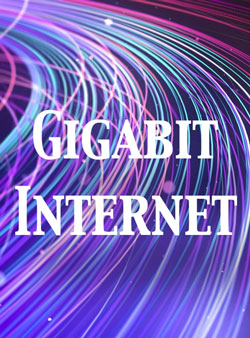There's no doubt that you need faster broadband connections than ever to run your business. Most companies now have an online presence. The few who don't yet need the internet to do business and provide WiFi hotspots to their customers. If yesterday's call solutions seemed to be slowing down to a bare minimum, you clearly need an update. Gigabit internet access may be just what you need now and for the foreseeable future.
 Is Gigabit Internet Really Right for Me?
Is Gigabit Internet Really Right for Me?What you really need is an invisible link. Whatever you do, line speed shouldn't hold you back. In fact, you should completely forget how you got on the internet. He just has to be there.
You probably need more speed than you think. In the last 20 years, the "Internet" has evolved from e-mail and a few very simple HTML sites in the form of brochures to a full-fledged Internet operation. Many of your customers will never set foot in your workplace again. They do everything online. It's second nature. Your phone is a web browser that you always have in your pocket. Your desktop computers have less software. Almost everything happens online and in real time. What is your PBX? Today, VoIP technology is likely to be integrated into video conferencing for unified communications.
What about your business operations? Do you keep instructions? What about customer or patient data? All your CRM systems are software based and most likely in the cloud. In fact, companies with their own data centers are becoming fewer and fewer. It's all about the cloud, and what the cloud lacks is communication with the outside world, especially with customers and suppliers.
In order to make your communication invisible to you and your employees, a few technical details are required. The queue must run very quickly. It's speed or power. In addition, he must react quickly. It's as hidden as speed. Long system latency means slow response. It also needs to be accurate and efficient in the sense that it doesn't skip details. This security is important in audio and video transmission. Single transmissions interfere with conversations and videos look distorted and even sloppy. A quality gigabit internet connection can make all of this much easier.
Your gigabit internet connection
Gigabit internet nearby? Maybe. You probably looked a few years ago and didn't find anything available. It is very likely that the situation has changed. Demand for ever-increasing speeds, particularly 4G and 5G wireless broadband speeds, has fueled a boom in fiber optic and microwave circuits. Additionally, new technology modems have enabled broadband cabling systems to deliver gigabit speeds over existing fiber optic cabling and copper-coax infrastructure.
Even if you think you don't need gigabit speeds right now, you should give it some serious thought. You'll need them sooner than you think. What you need is a DOCSIS 3.1 modem or Gigabit Ethernet port to connect to the internet. For example, you can start with a 100Mbps corporate broadband network and then upgrade to 1000Mbps or Gigabit.
Know your broadband types
You should be aware that there are two main types of broadband internet service. They are called dedicated and subscription. Dedicated internet access offers the highest prices, but it's the strongest and most reliable connection you can get. The name "Dedicated" means that 100% of the bandwidth is reserved for your use only. What you don't use remains available when you need it. A dedicated connection is usually the same too, with the same download and upload speeds.
Shared connectivity, like the ones you get with wired broadband and 4G and 5G wireless networks, is much cheaper but used by many users. You often notice this as fluctuations in line speed throughout the day. Shared connections also tend to be uneven, with download speeds about 10 times faster than upload speeds. The importance of these features depends on how you use the service.
Which internet connection is the best for your business? Discover gigabit broadband internet services near you.

Tidak ada komentar:
Posting Komentar